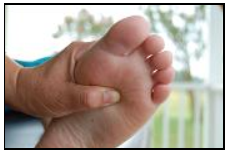Kidney 1
KI1 Acupressure Point
Use the Water Aroma Acu-Stick® to activate points on the Kidney Channel. Kidney 1 is an amazing pressure point for its grounding nature by returning the unrooted back to its source; it calms the Spirit, descends excesses from the head, and eases dizziness. KI 1 support Kidney Yin which represents substance, Blood, and the potential for cooling the body. Kidney Yin is the source of Yin for all of the energetic organ systems. When Yin is unrooted pathogenic Heat and Wind are free to roam upward in the body assaulting the head and mind.
Related Articles:
- Learn How Aroma Acu-Therapy Works
- The Water Element of Traditional Chinese Medicine Explained
- General Acupressure Directions-Video
- Kidney Yin Deficiency
![]()
Location of Acupressure Point KI 1
Kidney 1 is on the sole of the foot approximately at the junction of the anterior third and posterior two thirds of the sole between the second and third metatarsal bones. Apply the Water Element Aroma Acu-Stick® to Kidney 1 to activate its healing potential!
 Traditional Chinese Medicine Indications and Acupressure Point Combinations of KI 1
Traditional Chinese Medicine Indications and Acupressure Point Combinations of KI 1
Menopause
With hot flashes, night sweats, insomnia, agitation and/or headaches:
- Apply the Water Element Acupressure Stick to acupressure point Kidney 1
- Apply the Earth Element Acupressure Stick to acupressure point Spleen 4
- Apply the Fire Element Acupressure Stick to acupressure point Pericardium 6
Night Sweats
For night sweats due to Kidney Yin Deficiency:
- Apply the Water Element Acupressure Stick to Acupressure Point Kidney 1
- Apply the Water Element Acupressure Stick to acupressure point Kidney 3
- Apply the Water Element Acupressure Stick to acupressure point Kidney 7
Emotional Upset
The Kidney Yin cools the Heart, and the Heart warms the Kidney Yang creating a perfect balance. The Heart houses the mind and is the source of all emotions. If the Yin is not sufficient to keep the Heart cool emotions will become unbalanced. Kidney 1 helps to support the Yin but also is able to re-establish the communications between the Heart and Kidney energetic organ system once they have been disrupted.
- Apply the Water Element Acupressure Stick to Acupressure Point Kidney 1
- Apply the Water Element Acupressure Stick to Acupressure Point Kidney 3
- Apply the Fire Element Acupressure Stick to acupressure point Heart 7
Anger
Kidney Yin is the basis of Liver Yin. If the emotional upset becomes volatile due to Liver Heat with outbursts and rage:
- Apply the Water Element Acupressure Stick to Acupressure Point Kidney 1
- Apply the Water Element Acupressure Stick to Acupressure Point Kidney 3
- Apply the Wood Element Acupressure-stick to acupressure point Liver 2
Chronic Sore Throat
A sore throat that is not explained by a viral pathogen may respond to the treatment of Kidney 1 as the Kidney Channel traverses the throat and chronic Yin Deficiency can result in a chronic sore throat or mild to moderate throat pain. Apply the Water Element Acupressure Stick Acupressure Point Kidney 1 and 3 and apply the Fire Element Acupressure Stick to acupressure point Heart 8.
![]()
Other Name(s) of Acupuncture Point KI 1
- Yongquan
- Bubbling Spring
- Vessel in the Center of the Sole
- Earth Surge
- Stumbling Heart
- Earth Thoroughfare
- Yin Valley
Traditional Chinese Medicine Classifications of Acupuncture Point KIdney 1
- Wood Point
- Jing-Well Point
- Sedation Point
- Entry Point
Other Uses for Acupressure Point Kidney 1
Traditional Chinese Medicine Actions of Acupressure Point KI 1
- Nourishes Yin
- Clears Deficient Kidney Heat (from Yin Deficiency)
- Down-bears Yin Fire
- Descends Excess from the Head
- Subdues Wind
- Stabilizes the Spirit-Shen
Cautions: Do not use acupressure as self-care when pregnant without the guidance of a licensed acupuncturist. Always discuss new treatment modalities with your local health care professional.
![]()
Inchauspe A. A. (2013). Drawing the Yongquan protocol into the different stages of the cardiopulmonary resuscitation sequence. World journal of critical care medicine, 2(3), 17–20. doi:10.5492/wjccm.v2.i3.17
Faiz, S., Nikoubakht, N., Imani, F., Ziyaeifard, M., Sadegh, H., & Rahimzadeh, P. (2019). Comparison of Two Acupuncture Protocols (K1, DU25 or K1, DU26) Efficacy on Recovery Time of Patients After General Anesthesia, a Randomized Control Clinical Trial. Anesthesiology and pain medicine, 9(5), e96172. doi:10.5812/aapm.96172
Huang T. (2015). A Pilot Study: Warm Stimulation on (KI 1) to Relief Asthenopia. Evidence-based complementary and alternative medicine : eCAM, 2015, 641792. doi:10.1155/2015/641792
Rehman, I. U., Bin-Chia Wu, D., Ahmed, R., Khan, N. A., Rahman, A. U., Munib, S., … Khan, T. M. (2018). A randomized controlled trial for effectiveness of zolpidem versus acupressure on sleep in hemodialysis patients having chronic kidney disease-associated pruritus. Medicine, 97(31), e10764. doi:10.1097/MD.0000000000010764
Lee, M., Longenecker, R., Lo, S., & Chiang, P. (2019). Distinct Neuroanatomical Structures of Acupoints Kidney 1 to Kidney 8: A Cadaveric Study. Medical acupuncture, 31(1), 19–28. doi:10.1089/acu.2018.1325
Bullen, A., Awdishu, L., Lester, W., Moore, T., & Trzebinska, D. (2018). Effect of Acupuncture or Massage on Health-Related Quality of Life of Hemodialysis Patients. Journal of alternative and complementary medicine (New York, N.Y.), 24(11), 1069–1075. doi:10.1089/acm.2018.0030
This information has not been evaluated by the Food and Drug Administration. This information is not intended to diagnose, treat, cure, or prevent any disease.
